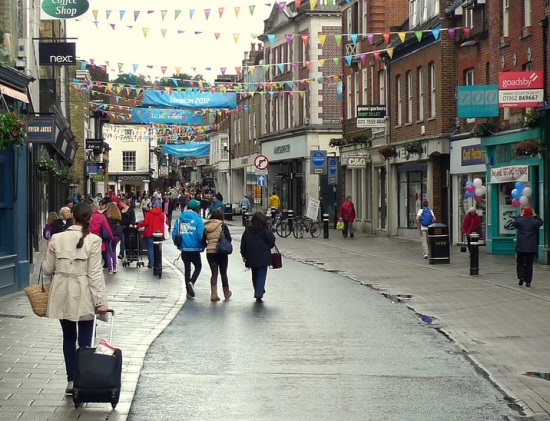The summer of sport last year had a hugely positive impact on the retail industry, with the aura of excitement and an influx of international visitors lifting consumer confidence and allowing the retail industry to take early steps towards recovery. One year on, this optimism seems to have been built upon, with consumers continuing to spend in earnest.

Winchester high street during the 2012 Olympic Games
Although the British Retail Consortium/ Springboard Retail Footfall Monitor indicated a dip in footfall for August – reaching the lowest point since March of this year – industry experts believe that this is due to the high footfall recorded during the same month last year. Most areas of the UK showed a lower number of consumers visiting their local high street or shopping centre, with only the North and Yorkshire posting growth of 0.1 per cent.
The Monitor records over 60 million footfall counts per week in 227 different shopping sites, and so manages to paint a relatively full picture of consumer action across the UK as a whole. This usually means that a dip sparks alarm amongst retailers but Retail Insights Director at Springboard, Diane Wehrle, points out that a falling footfall rate does not necessarily indicate a backward step in terms of consumer spending.
She says; “Given the increase in sales in August, the lack of uplift in footfall indicates that the number of customers visiting our retail locations is remaining steady in overall terms but they are spending more.
“The footfall performance of retail parks clearly reflects the fact that home products were the best performers in sales terms in August, which may well have deflected footfall away from high streets and shopping centres.
“In overall terms, however, the results for August indicate an increasing degree of stability in the performance of retail locations.”
Retail parks certainly fared better than shopping centres, which recorded a drop in footfall of 2.2 per cent. This has been something of a trend in recent months as consumers increasingly turn to the high street following large-scale publicity regarding the plight of small retailers.
However, the high street also recorded a loss – this time of 0.6 per cent. Yet this should not be too concerning as many towns and cities across the UK held Olympic-themed events last year in a bid to draw consumers to the high street by playing on current events.
With Christmas now officially approaching fast, retailers are gearing up for the busiest period of the year. Hopefully, the seasonal flurry will allow the BRC and Springboard to post yet more optimistic figures this time next month.
Do you think the reason footfall has decreased in recent years is primarily down to the economic situation, or do the positive sales figures indicate that online shopping plays a greater role in the changing face of the retail environment?
Previous Post
Parents are not the only People Finding Nurseries Safe